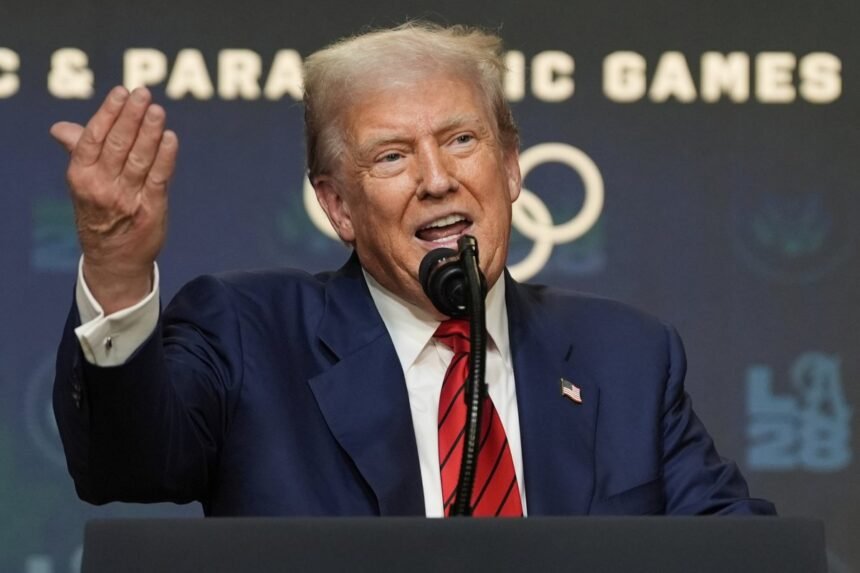Amid rising trade tensions, US President Donald Trump on Wednesday signed an executive order imposing a 25 percent ad valorem tariff on all Indian imports to the United States.
The measure, set to take effect from August 27, is reportedly in response to India’s ongoing direct and indirect purchases of oil from Russia—actions the White House claims weaken international sanctions and pose a threat to US national security interests.
In a significant escalation of trade tensions, US President Donald Trump on Wednesday signed an executive order imposing a 25 percent ad valorem tariff on all imports from India into the United States.
The move, which takes effect on August 27, comes in response to what the Trump administration describes as India’s ongoing direct and indirect imports of oil from Russia — a move Washington says undermines the global sanctions regime and threatens US national security interests.
The sweeping order, issued under the authority of multiple US trade and national emergency laws — including the International Emergency Economic Powers Act (IEEPA) and the Trade Act of 1974 — marks one of the most severe unilateral trade actions against India in recent history.
The additional tariffs will apply to all goods of Indian origin entering the US, unless specifically exempted, and will be levied on top of existing import duties.
Citing the continued enforcement of the national emergency declared in Executive Order 14066, first signed in March 2022 following Russia’s invasion of Ukraine, Trump stated:
“I find that the Government of India is currently directly or indirectly importing Russian oil.”
The order explicitly defines indirect imports to include oil purchased through third countries or intermediaries when the origin can reasonably be traced back to Russia.
“To address the national emergency described in Executive Order 14066, I find it necessary and appropriate to impose an additional ad valorem duty on Indian imports,” the order states.
According to the White House, the new tariff is meant to reinforce US sanctions on Russian energy exports and penalize countries engaging in trade that supports Russia’s war economy.
Implementation Timeline and Exemptions
The 25% tariff will take effect from 12:01 AM EDT on August 27, 2025, and will apply to all Indian imports arriving in the US, with a few exceptions:
-
Goods already in transit before the deadline.
-
Shipments entered for consumption before 12:01 AM EDT on September 17, 2025.
Certain categories may also be exempt based on prior executive orders or designated domestic status under US foreign trade zone rules.
However, US Customs and Border Protection has been authorized to strictly enforce the new tariffs, and the Secretary of Homeland Security may revise the Harmonized Tariff Schedule accordingly.
The executive order further clarifies that these new duties will be stacked on top of tariffs imposed under Executive Order 14257 (April 2025), which introduced reciprocal duties to address trade imbalances.
“The ad valorem duty imposed in Executive Order 14257 shall apply in addition to the ad valorem duty imposed in section 2 of this order,” the document notes.
This means certain Indian exports could face a combined tariff burden exceeding 50 percent, depending on product classification.
Scope for Future Escalation
Section 4 of the order empowers the US President to expand or amend the policy if India retaliates or if other countries are found engaging in similar Russian oil purchases.
The Commerce Secretary and Secretary of State have been directed to monitor such activities and recommend additional measures if necessary.
“Should the Government of the Russian Federation or a foreign country impacted by this order take significant steps to address the national emergency, I may further modify this order,” Trump wrote.
The administration has also hinted that more countries may be targeted if they’re found violating US sanctions by buying Russian oil — whether directly or through intermediaries.
Geopolitical and Economic Impact
India has defended its purchase of Russian oil at discounted prices, arguing it is essential for meeting domestic energy needs.
But these new US tariffs are expected to strain strategic relations between Washington and New Delhi — especially as Indian officials have maintained that Russian oil imports will continue.
Analysts warn that the tariffs may cause substantial economic fallout for both Indian exporters and American consumers.
As of this report, the Indian government had not issued an official response, though diplomatic sources indicate that high-level consultations are expected in the coming days.
This development signals not just a turning point in US-India trade relations, but also carries broader implications for geopolitical alignments amid a shifting global order. (Agencies)

